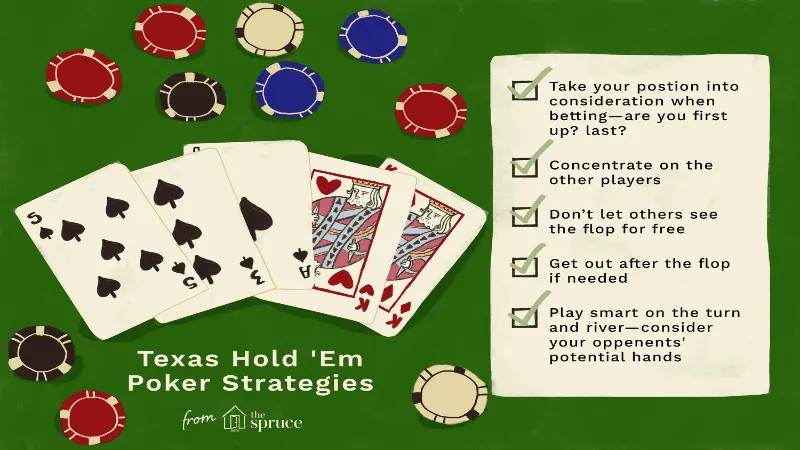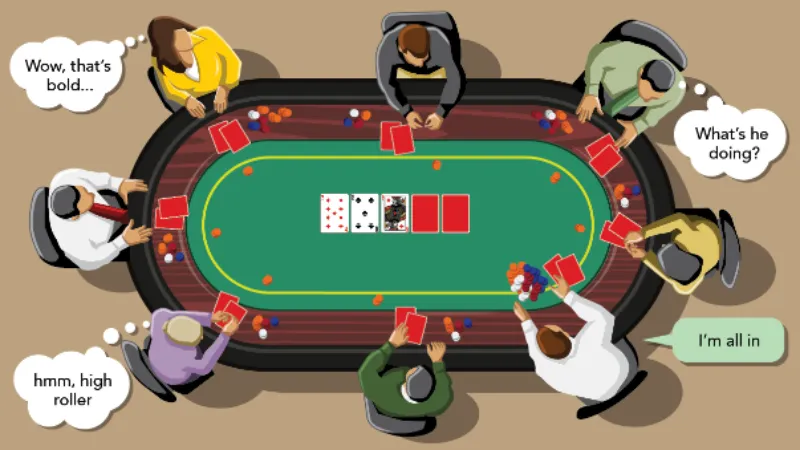Poker, originating in 16th century Europe, has evolved into various forms like Texas Hold’em and Omaha, gaining global recognition. From casual games 8xBet to high-stakes tournaments, it’s a staple in gambling. Despite its complexity, requiring skill, patience, and luck, we offer a guide to help beginners master the game.
Poker Strategies, Tips, and Tricks for Mastering the Game

Before delving into advanced strategies and tips, it’s crucial to have a solid understanding of the basic rules and gameplay of poker. This section will cover the fundamental elements that apply to most variations of the game.
What is Poker?
At its core, poker is a card game where players place bets based on the strength of their hand. The ultimate goal is to win the pot, which is the total amount of money or chips bet by all players in a hand. The pot goes to the player with the best hand, or the one who convinces others to fold their hands before showdown.
The Deck
A standard deck of 52 cards is used in poker, with each card having a rank and suit. The ranks, from highest to lowest, are Ace, King, Queen, Jack, 10, 9, 8, 7, 6, 5, 4, 3, and 2. In some variations, Ace can also serve as the lowest card, ranking below 2.
The four suits – hearts, diamonds, clubs, and spades – are all considered equal in poker. However, certain variations may use different suits as trump cards or give them a hierarchical order.
The Hand Rankings
A hand is a set of five cards that a player has at any given time. The value of a hand is determined by its rank, which is based on the combination of cards it contains. From strongest to weakest, the hand rankings are as follows:
- Royal Flush – This is the strongest hand in poker, consisting of a 10, Jack, Queen, King, and Ace of the same suit.
- Straight Flush – Five cards in sequential order and of the same suit, such as 5-6-7-8-9 of hearts.
- Four of a Kind – Four cards of the same rank, such as four Aces.
- Full House – A combination of three of a kind and a pair, such as three Queens and two 9s.
- Flush – Any five cards of the same suit, regardless of their ranks.
- Straight – Five cards in sequential order, but not of the same suit.
- Three of a Kind – Three cards of the same rank, such as three 10s.
- Two Pair – Two sets of pairs, such as two Kings and two 5s.
- One Pair – Two cards of the same rank, such as two Jacks.
- High Card – When no players have any of the above combinations, the highest card in their hand determines the winner.
In case of a tie, the player with the highest-ranking card wins. If both players have the same high card, the second-highest card is compared, and so on until a winner is determined.
The Gameplay
Poker typically involves two to ten players using a single deck of cards. A designated dealer shuffles and deals the cards, with the dealer position rotating clockwise after each hand.
Each hand starts with two hole cards dealt face down to each player, followed by five community cards dealt face up on the table. Betting occurs in four rounds, beginning after the hole cards are dealt and continuing after each new community card. Players can raise the bet to force others to match or fold.
The final showdown reveals remaining players’ hands, determining the winner of the pot. If all but one player folds during betting, the remaining player wins without revealing their cards.
Different Variations of Poker

While most people are familiar with Texas Hold’em, there are numerous other poker variations that you can try your hand at. Each version has its own unique rules, strategies, and gameplay, making them suitable for different skill levels and preferences. In this section, we’ll discuss some of the most popular poker variations and what sets them apart from each other.
| Poker Variation | Description |
|---|---|
| Texas Hold’em | The most popular poker variation worldwide. Players receive two hole cards and use them along with five community cards to form their best hand. |
| Omaha | Similar to Texas Hold’em, but players receive four hole cards and must use exactly two of them with three community cards to make their hand. |
| Stud Poker | Features a mix of face-up and face-down cards. Seven Card Stud deals seven cards to each player, with four face-up and three face-down. Five Card Stud deals five cards, with two face-down and three face-up. |
| Draw Poker | No community cards involved. Players are dealt five cards and have the option to discard and replace any number of them to improve their hand. Five Card Draw is a common variant. |
| Pineapple Poker | A variation of Texas Hold’em where players start with three hole cards and discard one after the second round of betting, adding uncertainty to the game. |
| Other Variations | Includes Chinese Poker, Razz, Badugi, and more. Each has unique rules and strategies, catering to different skill levels and preferences. |
Tips for Playing in Tournaments

While cash games are the most common form of poker, tournaments offer a different and more thrilling experience. In a tournament, players pay a fixed amount to enter, and the last person standing takes home the largest share of the prize pool. Unlike cash games, where you can buy-in anytime and leave whenever you want, tournaments have a set start and end time.
Playing in tournaments requires a different approach compared to cash games, and here are a few tips to help you navigate through them successfully.
Understand the Tournament Structure
Before entering a tournament, it’s crucial to understand its structure, as it can significantly impact your strategy. Some tournaments have a deep stack structure, meaning players get a large number of chips to start with, while others have a shallow structure, where players have fewer chips, and blinds increase quickly.
Knowing the blind levels, the size of the starting stack, and the total number of players will give you an idea of how the game will progress and how long it’s likely to last.
Be Mindful of Your Chips
In a tournament, your chips are your lifeline. Once you’re out of chips, you’re eliminated from the game. So it’s crucial to manage your chips wisely and avoid going all-in unless necessary. Even if you have a strong hand, it’s often better to play it safe and wait for a weaker opponent to go all-in so that you can maximize your chances of winning.
Adjust Your Strategy According to Your Stack Size
As the tournament progresses and blinds increase, your stack size will determine your options. If you have a big stack, you can afford to be more aggressive, as losing a few hands won’t put you in danger of being eliminated. However, if your stack is dwindling, it’s best to tighten up and wait for a good hand before making any risky plays.
Utilize Bubble Play
The “bubble” refers to the point in a tournament where only a few players remain before reaching the payout positions. At this stage, everyone wants to secure their spot in the money, so take advantage of this by playing aggressively and putting pressure on the short stacks. This increases your chances of winning the pot and forcing others to fold.
However, if you’re one of the short stacks, play cautiously and only bet with premium hands to avoid getting eliminated before reaching the money.
Stay Focused and Be Patient
Tournaments can last for hours, and it’s easy to get demotivated or lose focus during long sessions. It’s essential to stay patient, even when things don’t go your way. Remember that luck plays a significant role in poker, and having a bit of patience can turn the tides in your favor.
Common Mistakes to Avoid in Poker

Even with years of experience and extensive knowledge of the game, players can still make mistakes that can cost them games. While some mistakes may be unavoidable, many can be avoided by knowing what to look out for. Here are some common mistakes that both beginners and experienced players should avoid.
- Playing Too Many Hands: Beginners often play too many hands, leading to weak positions. It’s essential to fold weak hands rather than risk losing.
- Not Understanding Pot Odds: Knowing pot odds helps determine whether to continue playing or fold based on the potential payout versus the bet required.
- Ignoring Bankroll Management: Properly managing your bankroll is essential for long-term success. Avoid risking more than you can afford to lose in a single session.
- Getting Emotional: Emotions can cloud judgment and lead to mistakes. Stay calm and make logical decisions based on the situation and your cards.
- Failing to Adapt: Every game is unique, and strategies must adapt accordingly. Be flexible and adjust tactics based on table dynamics and opponents’ playstyles.
Conclude
Poker, a popular card game that has existed for centuries, has now become one of the most beloved card games in the world. From casual games among friends to high-stakes tournaments, poker has become an integral part of the gambling world. However, despite its widespread popularity, poker remains a complex and strategic game, requiring skill, patience, and a bit of luck to grasp.
